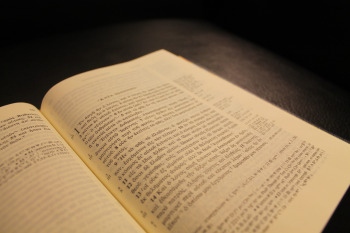"He Will Give You Another Helper" -- John 14:15-31
 Tuesday, August 25, 2015 at 09:51AM
Tuesday, August 25, 2015 at 09:51AM  The Forty-Sixth in a Series of Sermons on the Gospel of John
The Forty-Sixth in a Series of Sermons on the Gospel of John
Every Jew confessed the famous words of the Shema–“Hear, O Israel: The Lord our God, the Lord is one.” Yet when Jesus began his messianic mission he identified himself as a divine figure (the Son of Man), and in John 8:58 declared himself to be one with YHWH–“Truly, truly, I say to you, before Abraham was, I am.” Although the disciples believed that Jesus was Israel’s Messiah, they had a much harder time understanding how both Jesus and YHWH were the one true God. Jesus even uses the “I am” formula when celebrating the Passover with his disciples, when he tells them “I am the way, and the truth, and the life.” He even goes on to tell them, “I am in the Father and the Father is in me.” Now Jesus will speak of a third divine person, the Helper, who will come to the disciples after Jesus ascends into heaven and returns to the Father’s dwelling, where Jesus is preparing a place for them. It is this “Helper” (the Holy Spirit) who will remain with them after Jesus departs, and it is through his person and work that Jesus will be present with his disciples.
We are in the midst of a series on the Gospel of John, and we are considering the “Upper Room Discourse” in John 13-17, which was given by Jesus immediately before his betrayal, arrest, and crucifixion. Last time we considered the first fourteen verses of John 14, while in this sermon we will consider the balance of the chapter (vv. 15-31), in which Jesus begins to reveal to his disciples the person and work of the Holy Spirit, the third person of the Holy Trinity.
As the Passover celebration begins, Jesus washes his disciples’ feet, and make predictions about Judas (who will betray him) and Peter (who will deny him). Jesus also gives the disciples a new commandment that they love one another. As chapter 14 begins, it is clear that the disciples are troubled by these developments. For one thing, Jesus is obviously burdened by the weight of the ordeal ahead. He has told the disciples that he is about to depart from them, and undergo such great suffering that the disciples can hardly imagine it. To prepare them for their new ministry (founding the church) after his ascension into heaven, Jesus has much to teach the disciples during this their last evening together. But the disciples are having a hard time understanding the things which Jesus is telling them. Their own treasurer (Judas) will betray Jesus? Peter will deny him? Jesus implying that he was about to die, and yet he would see the disciples again? There is much for the disciples to take in, and they are having trouble doing so.
In the first part of chapter 14 (vv. 1-14), Jesus tells the disciples not to be troubled–they must believe in him–that is, trust that Jesus will see them through the ordeal ahead. The reason why they should not be troubled is that even though Jesus is going away, he will prepare a place for them where his Father dwells (in heaven). Jesus will ensure that there is room there for all who believe him–in his Father’s dwelling place are many rooms. When Thomas asks Jesus “Lord, we do not know where you are going. How can we know the way?” Jesus answers him, declaring that “I am the way, and the truth, and the life. No one comes to the Father except through me. If you had known me, you would have known my Father also. From now on you do know him and have seen him.” With unmistakable clarity, Jesus declares himself to be the only way to heaven–he is the true temple of God. At the moment of his death upon the cross, God will tear open the veil in the temple separating the holy place from the most holy place. Jesus is now the way to heaven, and who, through his death and resurrection, will remove the barrier between God and his people (human sin) symbolized by the temple veil which separated God from his people.
The talk of “seeing God” prompts Philip to ask Jesus the same question Moses asked YHWH in Exodus 33. “Lord, show us the Father, and it is enough for us.” Philip’s curiosity has gotten the better of him. God protected Moses from his glory by hiding Moses in the cleft of a rock, but Philip assumes that since the Father is in Jesus, and Jesus is in the Father, Jesus can show Philip what YHWH would not show Moses. Jesus’ answer reveals his divine identity, which has been veiled by human flesh. “Have I been with you so long, and you still do not know me, Philip? Whoever has seen me has seen the Father.”
To read the rest of this sermon, Click Here


Reader Comments